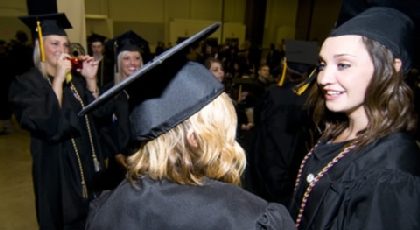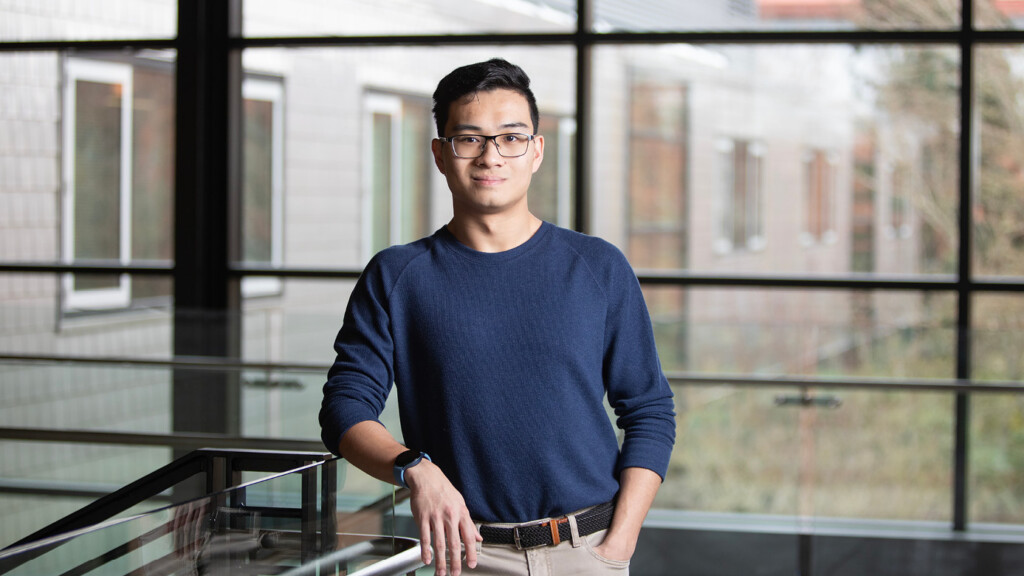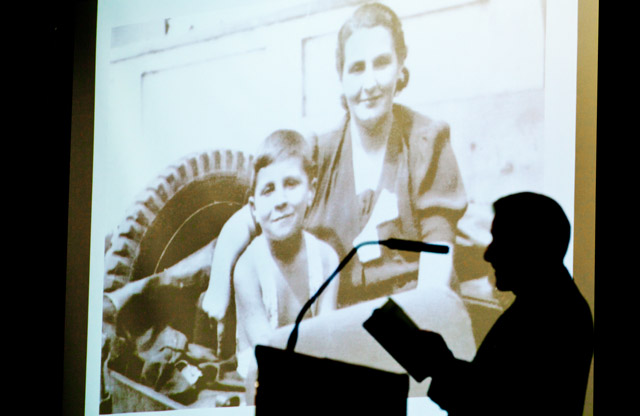Page 54 • (644 results in 0.035 seconds)
-

Tiffany Walker fell in love with choral music in sixth grade and never looked back. An accomplished conductor and vocalist, Walker earned a Doctor of Musical Arts degree in choral conducting at the University of Washington in spring 2022 and is in the second year…
spring 2022 and is in the second year of a two-year appointment as a visiting assistant professor at PLU. Walker conducts University Chorale and University Singers and teaches conducting. PLU News met with her recently to discuss her passion for choral music and her experience thus far at PLU.When and why did you fall in love with choral music? I was in the sixth grade when the elementary choir took a field trip to the high school. I don’t remember much about what happened that day, but I remember
-

As a student, Allen Tugade ’24 engaged in academic and applied sociological research on the student population of Pacific Lutheran University. Tugade was a member of Choir of the West and a well-known student leader on campus, serving as a Wild Hope Fellow and with…
planning on taking a few gap years before grad school. I want to get my PhD in social computation–people numbers–and go into applied research rather than academia. Until then, I want to get a job adjacent to the field. Any specific plans for after commencement? I am doing Vashon Opera. I am in the chorus, which is my first professional gig, yay! And in July, for the first three weeks, I am doing the [PLU] Summer Opera Workshop. Read Previous Ash Bechtel ’24 combines science and social work for
-
Originally Published in 2014 If you read the acknowledgements of the books that I’ve written, you will notice that I always thank some group of students for their help and insights. With The Task of Utopia , I thanked a particular class of students who…
and arguments in the field. I can often put them in contact with authors we’re reading. I have also worked with some students who have done well in these classes in conducting student- faculty research on a variety of animal-related issues. This work outside the classroom has resulted in collaborative projects that have been presented at conferences and published in books and journals. For me, scholarship and teaching are fluid aspects of one process and they regularly blend into each other. I
-

In their own words By Chris Albert Soon new PLU graduates will go out into the world. In the following, some Lutes share their stories of why they came to PLU, what their experiences have been and what’s the next chapter in their lives. More…
focus of my time at PLU. The most important memories I’ve made here center on the relationships I’ve built with professors, and the times when I’ve been challenged to dig deeper into the material and to think in completely different ways. The experiences I cherish most are those when I’ve sat in the classroom, listening to a lecture, and that theory I’ve been studying so hard to really understand finally makes sense, all the pieces finally fit together. Professors like Dr. Huelsbeck, Dr. Eric Nelson
-

In the spring of 2021, Kenzie Knapp ’23 was awarded a Udall Foundation scholarship. The Udall Foundation awards scholarships, fellowships, and internships to students pursuing fields of study related to the environment or Native American nations. Knapp has served as a G.R.E.A.N. club officer, is…
for her to get into Environmental studies and why she felt like they didn’t fit in, especially as a student of color because of how the environmental field has unfortunately been perceived to be predominantly white folks, despite indigenous leadership through the years. I had a crash course on indigenous governments and the road to sovereignty as far as intergovernmental relations. We also had a public service fair where we went into breakouts so we could talk to individuals who are working in
-
by Jenna Stoeber Christmas break is nearing, and with it comes a chance for faculty to catch their breath after a long and hard fall—before revving back up for another semester. The holiday break is ideal for exploring new methods of teaching, so why not…
Earth is easily applied to a variety of topics, and there is no shortage of tutorials to help you get started. For a browser-based software, consider using Google’s Tour Builder software, which also has plenty of online help available. Virtual Tours The excitement doesn’t end there! A wealth of ready-to-use virtual tours can be found online, providing an in-depth look at sights that would otherwise be very difficult to visit on a field trip. Here are some of our favorites: Get mesmerized with an
-

The Fall 2020 semester had its challenges for PLU students and faculty alike. However, one of the bright spots to lift our spirits has been learning virtually from guest artists who graciously shared their wisdom and knowledge with Theatre and Dance students over the course…
feel really lucky that the Theatre department provided opportunities for interaction with working theatre artists. I specifically loved Bryce Pinkham’s masterclass. I felt so lucky to be able to work a monologue with a successful professional in the field. I learned so much about auditioning and my favorite piece of advice was to use your monologue to achieve your objective. Bryce noted that watching the journey of tactics and then achieving what you want is a super exciting audition. —Cassie
-

Brian Sung ’24 has made the most out of his PLU years inside and outside the classroom. In the classroom, he’s an international honors student with a double major in business and economics and a double minor in data science and statistics. Outside the classroom,…
Oregon, but I found a great, flourishing Asian community here that I can call my friends. It is a place that makes me feel like I can be me. Who impacted you the most at PLU? Dr. Sailu Lulu Li has been my biggest mentor. She is also from China. Dr. Lulu jump-started my finance career and walked me through how to navigate America as a first-generation Chinese immigrant, especially in the field of finance. You started as a business major with a concentration in accounting but switched to a
-

Have you ever wondered how the ocean’s tiniest inhabitants play a significant role in shaping our world? Marine microorganisms, minuscule life forms, wield a vital influence over our planet’s climate. They manage crucial components like carbon and oxygen within the vast oceans and the atmosphere.…
project completely. Still, failure is an incredibly valuable experience in the scientific field that teaches you just as much, if not more, than success. Of course, this is a difficult idea to accept as no one likes to fail, but the reality is that people make science, and people make mistakes, which is ok,” concluded Flaspohler. "Professor Boysen and I are looking at samples I had taken from different algae cultures I was growing," said Flaspohler. "These samples were taken daily and run through a
-

George Elbaum reads from his book “Neither Yesterdays Nor Tomorrows” about his survival in Poland during WWII. On the screen behind him is a picture of Elbaum and his mother taken shortly after the war ended. (Photo by John Froschauer) Survivor of the Warsaw Ghetto…
1944. On the way out of the city, the family stopped to rest and Elbaum, then about six, wandered out into a field, where he picked up what he thought was a toy with an odd pin at the top, which he pulled. Just then Leon called Elbaum back to the road, and the boy tossed it into a ditch, where it exploded, harmlessly. “As I said, luck,” Elbaum laughed. When the war ended, Elbaum and his mother were reunited lived first in Warsaw, setting up book stores for the communist government, then Paris and
Do you have any feedback for us? If so, feel free to use our Feedback Form.


